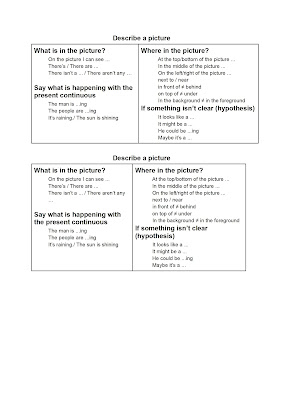Students learn how to present orally a set of documents using the appropriate expressions (linking words, verbs...) and practise their reading, writing and speaking skills.
(CCF exam paper for final oral exam of BTS students and possible production)
In this post, you will find an assessment paper that I made last year to prepare students for their final oral exam (BTS TSMA Sujet CCF), along with an example of what a possible presentation might look like.
I have also included lists of useful expressions that I put together and that can be used to describe a picture, to make a presentation and to talk about a text.
1. Assessment paper (BTS TSMA Situation d'évaluation 1 Sujet CCF)
Document 1: Article
When and Why to Hire a Full-Time Agronomist
“Our advice is unbiased regarding inputs; whether you spray or don’t spray or what seed you choose has no effect on us. Customers feel like this is a place where they can get good advice from our agronomists...”
It was apparent and became more so over time, that the agronomic decisions producers are making depend on the equipment. And it’s important that we understand those agronomic intentions so that we can ensure the machine is delivering what the producer wants. Our belief has grown stronger over time that we, as an equipment dealer, must understand this.
Hiring Agronomists for an Iron Dealership
Our intention in hiring an agronomist was to understand the relationship between the equipment and the seed, nutrient and application prescriptions. Being on staff, he would deal with the prescriptions to equipment and potentially develop prescriptions for farmers who had the technology on their seeding and spraying equipment. The first thing that was obvious was the need for an experienced agronomist because our reputation would depend on the advice given out. Providing professional advice on how much of an input to put down is a significant decision and we needed someone with a good track record. That certainly was the right decision. Plus, it also helped on the revenue side to have someone come in with a plan of what they can bring to the table. The agronomist we hired had about 10 years of experience, with a fair amount of clients who were common customers.
Document 2: Picture
2. Possible production (BTS TSMA Situation d'évaluation 1 Sujet CCF)
AGRONOMY, FARMERS AND DEALERSHIPS
This set of documents consists of 1 text - an article which was taken from the website “farmequipment.com” (dot com) and 2 pictures. It deals with agronomy, farming and farm equipment. The core of the question is what are the links between agronomy, farming and farm equipment. Also, it raises the issue of what agronomists can bring to farmers and dealerships in terms of equipment use, yield improvement, farm management, and also reputation building.
First, agronomy is a key element in farming. Farmers rely on machines for their work and it is paramount (very important) that they know how to use it and take the full advantage of it. In the text, the author argues that the expertise of the agronomist can help the farmer figure out (understand) how to use the equipment that they have by for instance telling them how much fertilizer or nutrient to spray on their crop. The first picture shows a man holding a computer in the middle of a cornfield and there is no doubt that he is an agronomist. With his computer, he analyses the field with precision farming tools. Those tools are designed to gather (rassembler) data about the soil, the crop, the weather … etc… so they give valuable information to the agronomist, who can then advise the farmers on the amount of nutrient that the crop needs for example.
Also, because agronomists are so valuable to farming, they can be a great addition to a dealership providing (pourvu que) they have enough experience and already existing customers, who would then become dealership’s customers. Indeed in the second part of the text, the author points out that hiring an agronomist is a great way to consolidate a dealership reputation and increase their income. The dealership can sell their equipment and have an in-house agronomist who gives useful advice to the farmer on how to make the most of it. For example on the second picture, the equipment is a self-propelled sprayer. We can’t see the logo but the green and yellow colours indicate that is a John Deere. Only John Deere can put these colours together on their farm equipment. Another brand recently tried to use them and John Deere sued them in court in the US and won. So green and yellow are officially and unmistakably part of John Deere’s trademark. Such equipment is used to spray inputs on the crop and thanks to the in-house agronomist, the dealership can give extensive advice to the farmers so that they are able to achieve their goals in terms yields. In doing that, he builds himself a reputation and strengthens his link with the farmers.
In my opinion, the documents - and especially the article - are very interesting and informative. It presents a useful and efficient way for the dealership to increase their list of clients and therefore also their income. Nowadays with the increasing number of pollution issues and the fact that the world population is about to reach 9 billion people in 2050, I believe that agronomy has an important role to play in order the help farmers meet the world’s needs and reduce the environmental risks linked to pollution and global warming.
(537 words)
3. Lists of useful expressions
Fiche d'expressions utiles pour décrire une photo.
Fiche d'expressions utiles pour parler d'un texte.








